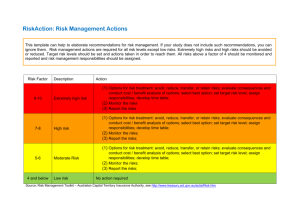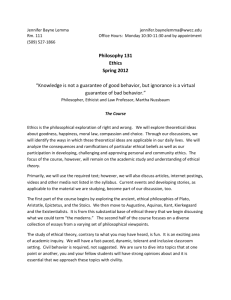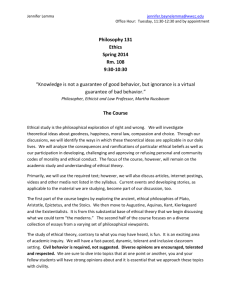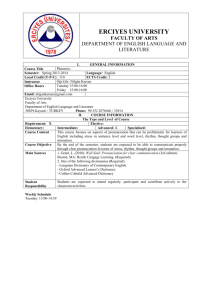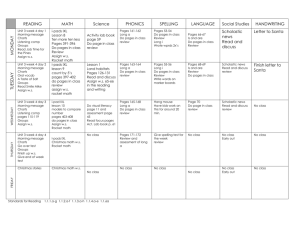View Syllabus
advertisement
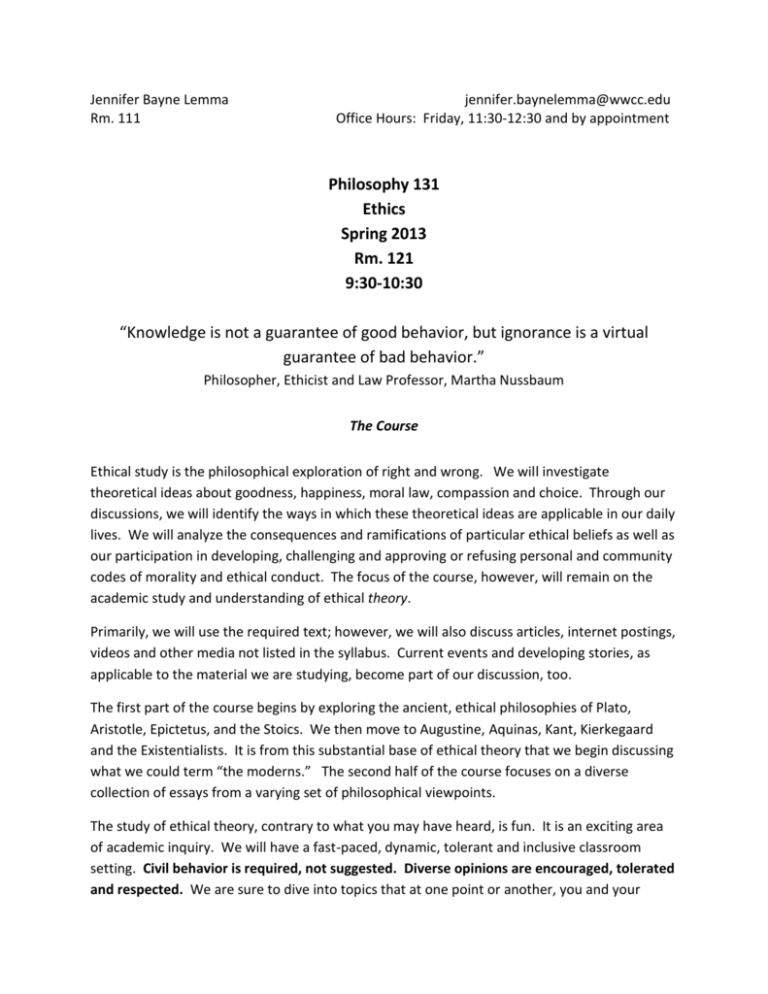
Jennifer Bayne Lemma Rm. 111 jennifer.baynelemma@wwcc.edu Office Hours: Friday, 11:30-12:30 and by appointment Philosophy 131 Ethics Spring 2013 Rm. 121 9:30-10:30 “Knowledge is not a guarantee of good behavior, but ignorance is a virtual guarantee of bad behavior.” Philosopher, Ethicist and Law Professor, Martha Nussbaum The Course Ethical study is the philosophical exploration of right and wrong. We will investigate theoretical ideas about goodness, happiness, moral law, compassion and choice. Through our discussions, we will identify the ways in which these theoretical ideas are applicable in our daily lives. We will analyze the consequences and ramifications of particular ethical beliefs as well as our participation in developing, challenging and approving or refusing personal and community codes of morality and ethical conduct. The focus of the course, however, will remain on the academic study and understanding of ethical theory. Primarily, we will use the required text; however, we will also discuss articles, internet postings, videos and other media not listed in the syllabus. Current events and developing stories, as applicable to the material we are studying, become part of our discussion, too. The first part of the course begins by exploring the ancient, ethical philosophies of Plato, Aristotle, Epictetus, and the Stoics. We then move to Augustine, Aquinas, Kant, Kierkegaard and the Existentialists. It is from this substantial base of ethical theory that we begin discussing what we could term “the moderns.” The second half of the course focuses on a diverse collection of essays from a varying set of philosophical viewpoints. The study of ethical theory, contrary to what you may have heard, is fun. It is an exciting area of academic inquiry. We will have a fast-paced, dynamic, tolerant and inclusive classroom setting. Civil behavior is required, not suggested. Diverse opinions are encouraged, tolerated and respected. We are sure to dive into topics that at one point or another, you and your fellow students will have strong opinions about and it is essential that we approach these topics with civility. How it Works The course has four major components: lectures, in-class study questions, take-home question responses, and a final exam. There will also be a mid-term quiz. The class is built around a 435-point scale. Lectures focus on the philosopher or philosophical concept we are currently studying. It is your responsibility to take notes and relate the lectures to the readings. At the conclusion of most lectures, you will be given a question on that day’s lecture/reading and you will respond in writing before you leave the classroom. These questions are worth 10 points each and there are 20 questions throughout the course, resulting in 200 available points. The in-class question responses make up the bulk of the course points, i.e., if you come to class and do the work, you will do very well in the overall course. In-class questions should regularly include a quote/reference citation from the reading of that day. The take-home questions must be typed, double-spaced and returned on time. Take-home question assignments are worth 15 points each, resulting in 150 available points. Take-home responses should include two quotes from the textbook readings unless otherwise indicated. Late work is not accepted. However, you may drop two in-class questions and one take home question without penalty. The final exam will be worth 60 points. It is a combination of multiple choice, true and false and essay questions. It is a cumulative exam, covering the entire course. All standard rules apply: No cell phones in class, no texting, no computers or tablets, no whispering/talking, etc.; any and all distracting behavior will result in a reduction in your grade. Please remember that texting during class will result in a reduction of your grade. Repeated offenses will result in failing or dropping the course at the instructor’s discretion. Turning in work that is not your own will obviously result in failing or dropping the project and/or the course. To request accommodations related to a disability, contact Claudia Angus, Ph.D., Coordinator of Disability Support Services, Room 133C located in the Student Development Center or call 509 527 4262, or email claudia.angus@wwcc.edu. Extra Credit projects may be offered for attending and writing about pre-approved lectures, art events and concerts as are applicable to this course. In addition, students may have the option to write an extra credit paper. This is a specific outline of what I am hoping we are able to cover in class. However, it is subject to change based on student interest, discussion direction and availability of guest lecturers. Date Topic/Philosopher Readings/Questions/Assignments 4/1 Introduction: Ethics, Cultural Relativism, Absolutes Introduction/Plato Plato Plato/Social Contract Theory/ Hobbes Plato/Social Contract Theory/Hobbes Syllabus Review; Assign. p. ix-xiv 4/8 4/9 4/10 4/11 4/12 Aristotle/Virtue Theory Aristotle/Virtue Theory Stoicism Epictetus; The Stoics The Stoics; Col. John Stockdale Assign. p. 80-84 (Aristotle) Question #3 Assign. p. 85-106 (Epictetus) Question #4 Take Home Question #2 4/15 Epicurus 4/16 4/17 4/18 4/19 Augustine Aquinas Kant Kant Question #5; Assign. p. 107-109; p. 116-118 (Augustine) Assign. p. 119-124 (Aquinas) Assign. p. 188-190 (Kant) Question #6; Assign. p. 201-213 (Kant) Take Home Question #3 Assign. p. 213-224 (Kant) 4/22 4/23 4/24 4/25 Kant Kierkegaard Kierkegaard Kierkegaard; Existentialism Sartre; The Self and Other; DeBeauvoir Question #7 Assign. p. 299-305 Hallie Hallie/Buber Guest Lecturer Question #9 4/2 4/3 4/4 4/5 4/26 4/29 4/30 5/01 Assign. p. 3-5; 38-42Question #1 Question #2; Assign. p. 134-143 (Hobbes) Take Home Question #1Assign. p. 43-45; p. 66-72 (Aristotle); Question #8 Assign. 328-332 (Sartre) Take Home Question #4; Assign. p. 333-349 (Hallie) 5/02 5/03 Lecture/King Discussion TBD Take Home Question #5; Assign. p. 356-377 TBD 5/06 5/07 Mid-term Quiz Coles/Integrity of the individual General Lecture/Discussion General Lecture/Discussion Rawls Mid-Term Quiz Assign. p. 350-355 (Coles) Lecture on Culture/Custom No Class Advising Day MacIntyre General Lecture/Discussion on Epigenetics General Lecture/Discussion Assign. p. 396-423 (MacIntyre) Noddings No Class Noddings and Feminist Ethics; Motherhood Levinas, Nussbaum, and Reciprocity Leopold Question #13 No Class No Class Memorial Day Leopold/Environmental Ethics Economic Ethics Singer General Lecture/Discussion No Class Memorial Day General Lecture/Discussion Regan Question #17; Assign. p. 530-544 (Regan) 5/08 5/09 5/10 5/13 5/14 5/15 5/16 5/17 5/20 5/21 5/22 5/23 5/24 5/27 5/28 5/29 5/30 5/31 6/3 6/4 Question #10; Assign. p. 322-327 (Midgely) Take Home Question #6; Assign. p. 378-395 Question #11 No Class Advising Day Take Home Question #7 Question #12 Assign. p. 424-444 (Noddings) Question #14 Take Home Question #8; Assign. p. 486-305 (Leopold) Question #15; Assign. p. 506-529 (Singer) Question #16 Take Home Question #9 Take Home Question #10; Assign. p. 545-566 6/5 6/6 6/7 Walzer General Lecture/Discussion Review for the Final 6/10 6/11 6/12 6/13 6/14 Review for Final Review for Final No Class No Class Final Exam Question #18 Question #19 Question #20 Exams begin Exams continue 9:30-11:30 In Class Questions: 20 at 10 points each = 200 points Take Home Questions: 10 at 15 points each = 150 points Mid-Term Quiz = 25 points Final Exam: 60 points = 60 points ------------------ Total Points Available 435 points Grading Scale: 94 + = A 73 = C 90 = A- 70 = C- 87 = B+ 67 = D+ 83 = B 60 = D 80 = B- 59 = F 77 = C+
